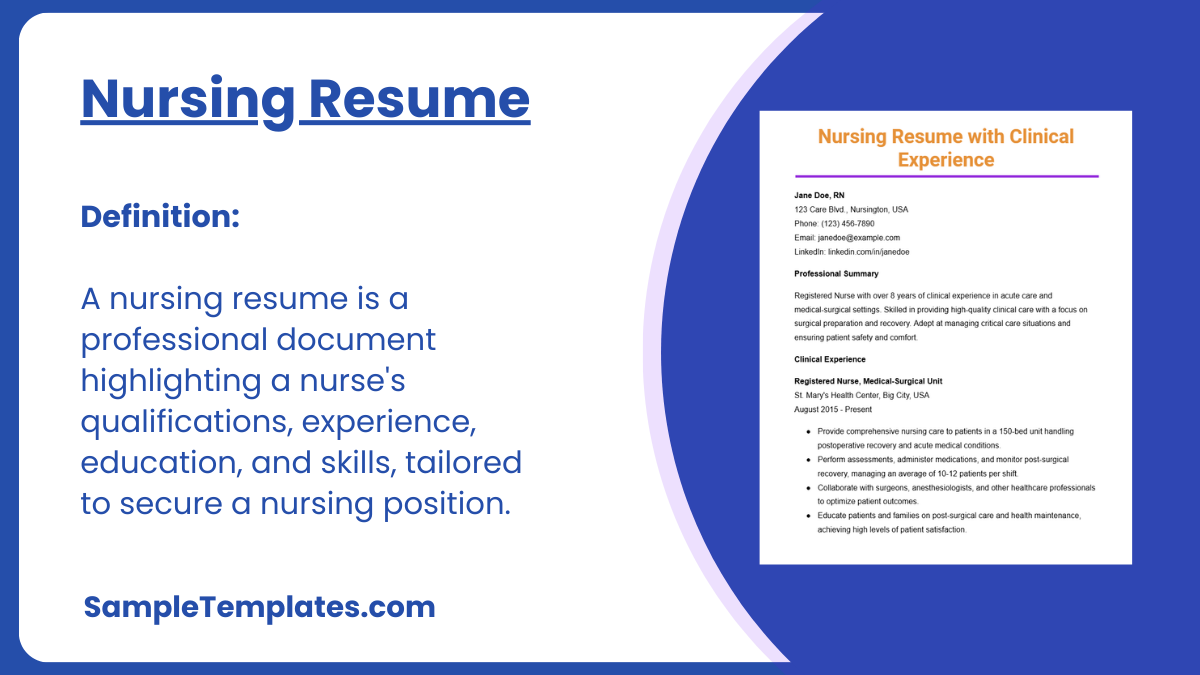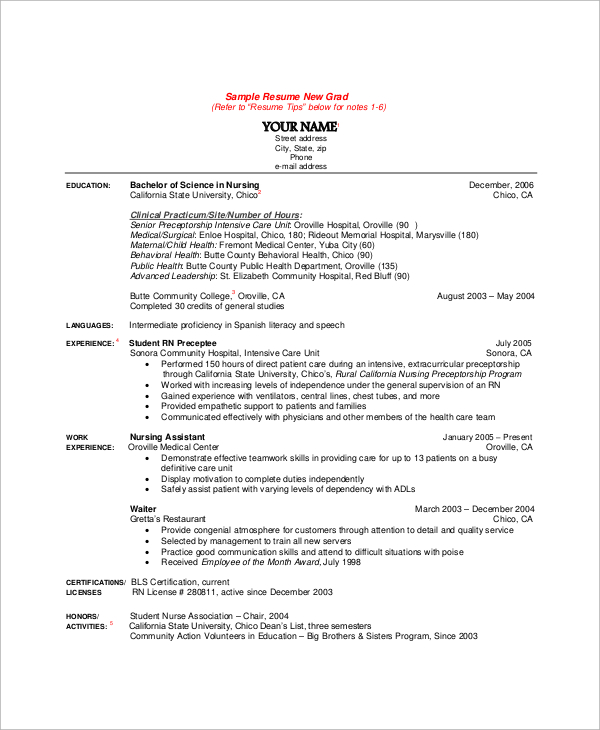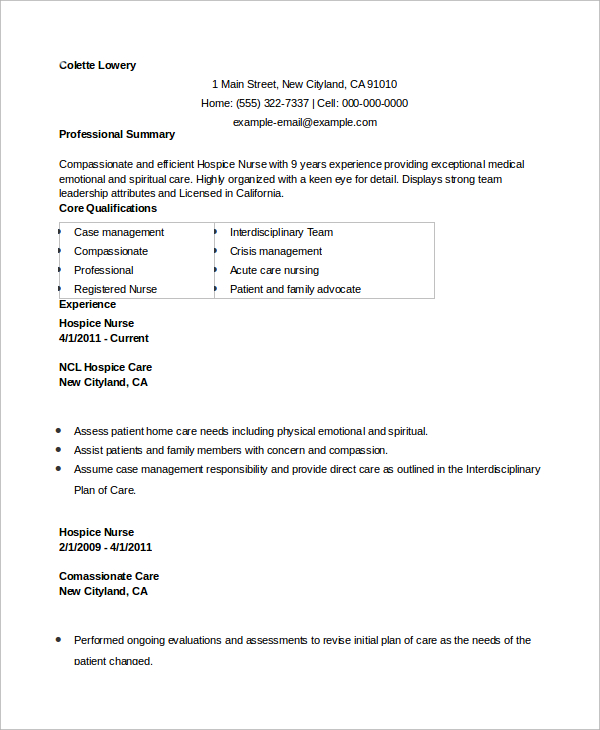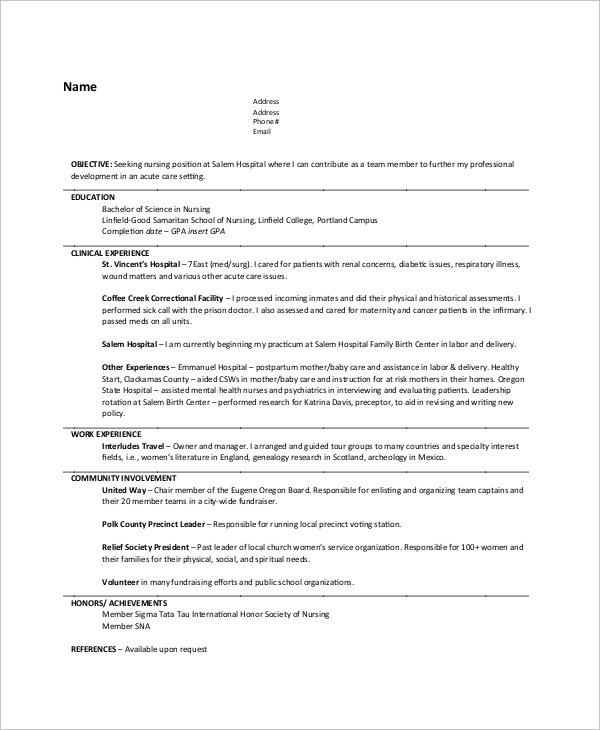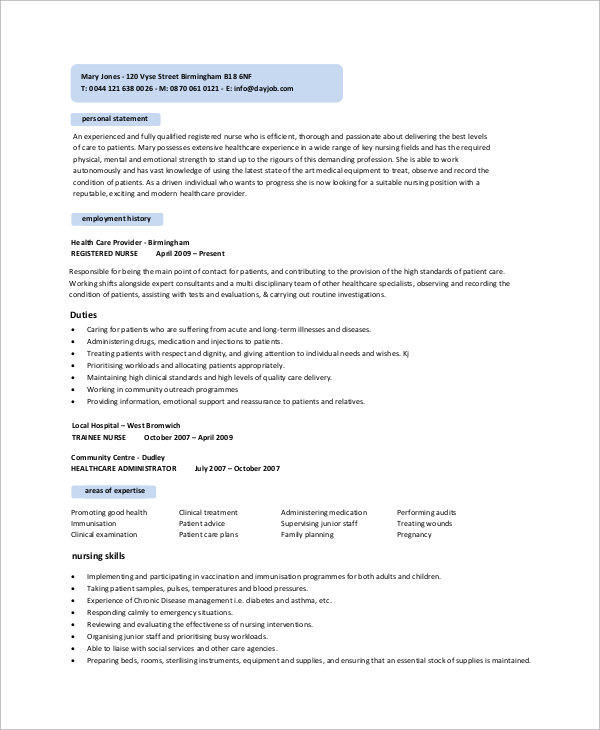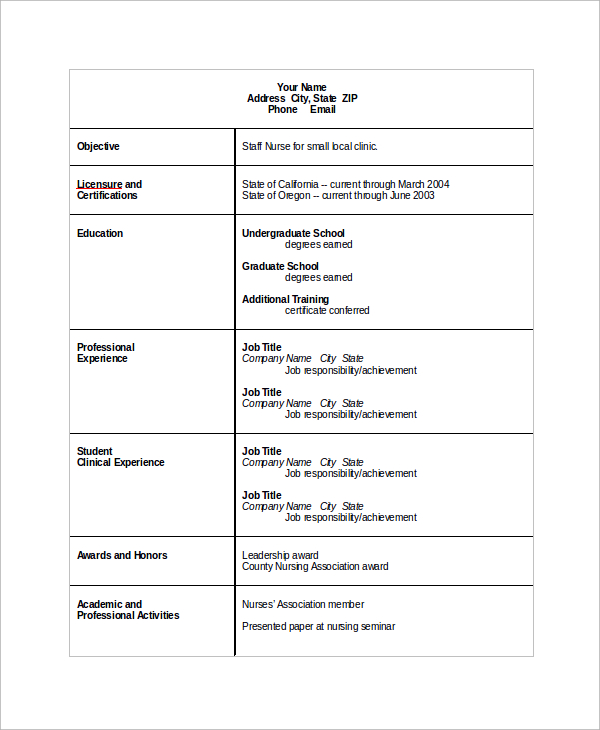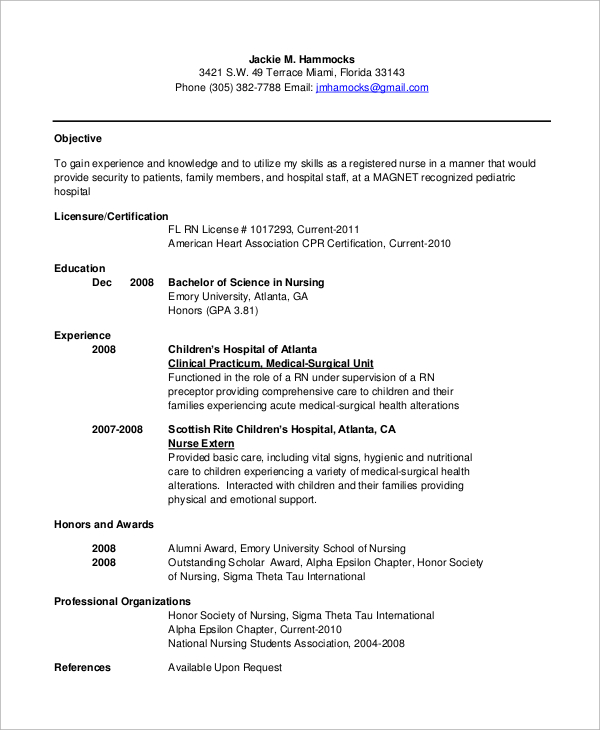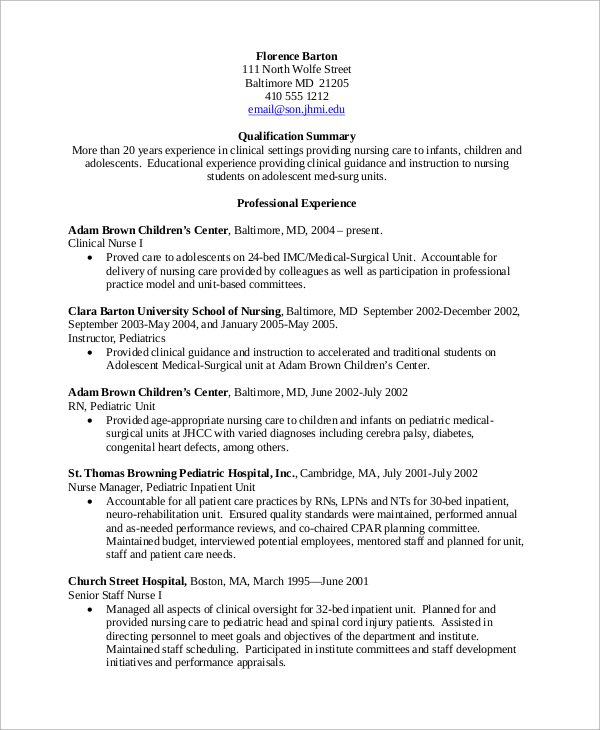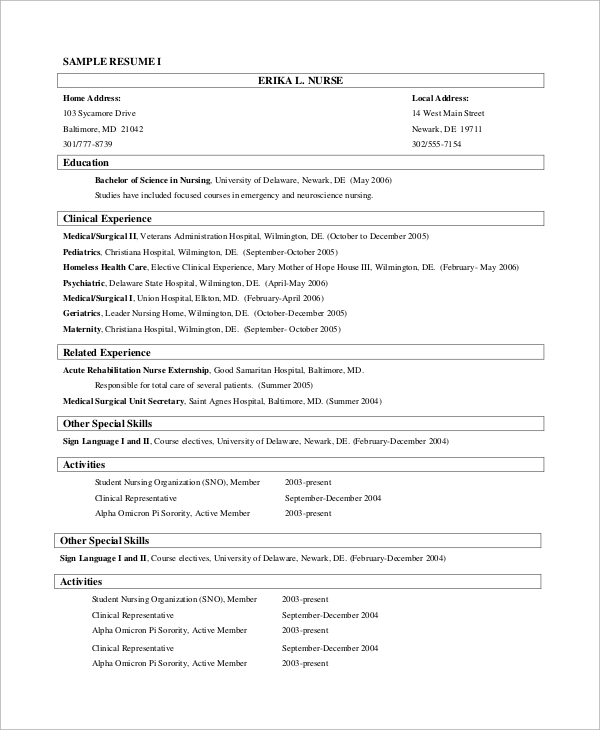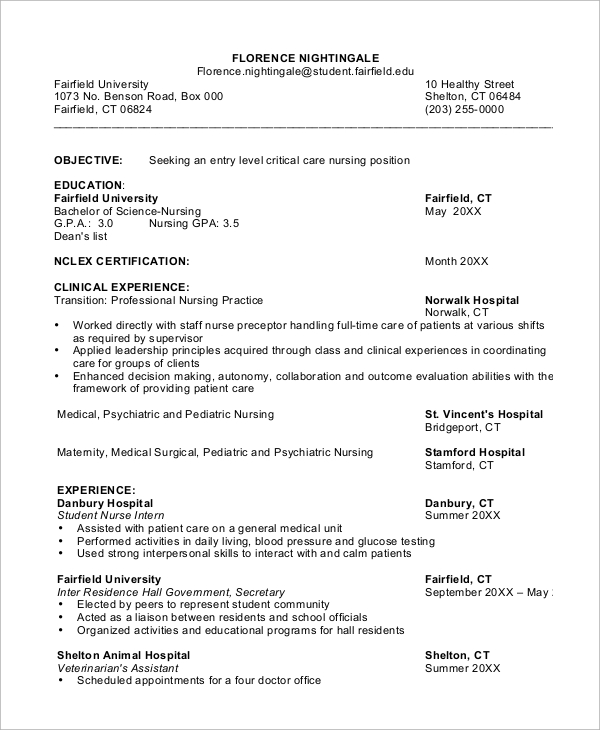Resumes are the most important documents that pave the way to get a job easily. An interviewer gets an overall idea of a candidate by reading his or her Sample Resumes. The following nursing resumes have fantastic formats and designs, and they are fully editable as they are also present in Doc file. They are very efficient for a nursing student who can edit them to create their resumes for applying in any desired job and get an edge over the other competitors.
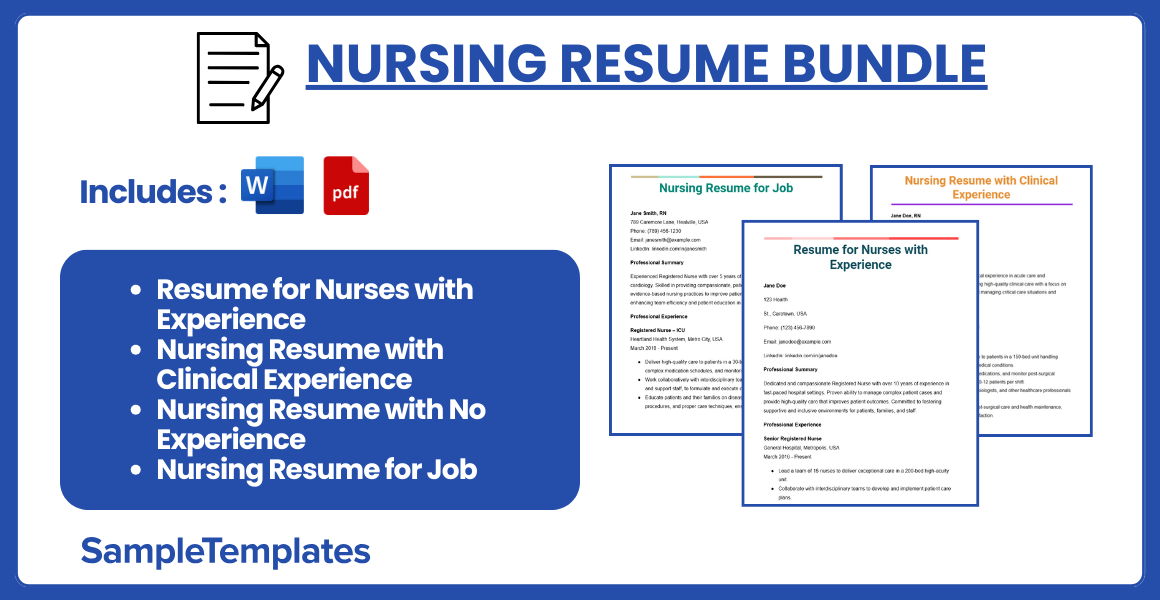
Download Nursing Resume Bundle
Resume for Nurses with Experience
Jane Doe
123 Health
St., Caretown, USA
Phone: (123) 456-7890
Email: [email protected]
LinkedIn: linkedin.com/in/janedoe
Professional Summary
Dedicated and compassionate Registered Nurse with over 10 years of experience in fast-paced hospital settings. Proven ability to manage complex patient cases and provide high-quality care that improves patient outcomes. Committed to fostering supportive and inclusive environments for patients, families, and staff.
Professional Experience
Senior Registered Nurse
General Hospital, Metropolis, USA
March 2016 – Present
- Lead a team of 15 nurses to deliver exceptional care in a 200-bed high-acuity unit.
- Collaborate with interdisciplinary teams to develop and implement patient care plans.
- Conduct staff training sessions focused on advanced patient care techniques and compliance with healthcare regulations.
- Spearheaded a project that reduced patient readmission rates by 20% within a year.
Staff Nurse
Community Hospital, Smalltown, USA
June 2010 – February 2016
- Provided patient care in a 100-bed community hospital with a focus on pediatric and adult care.
- Administered medications, managed intravenous lines, and monitored patient conditions.
- Assisted in the development and updating of patient care plans alongside healthcare teams.
- Supported hospital-wide initiatives to improve patient satisfaction scores, which increased by 15% during my tenure.
Education
Bachelor of Science in Nursing
University of Health Sciences, Anytown, USA
September 2005 – May 2009
Certifications
- Registered Nurse (RN), State of USA
- Certified Pediatric Nurse (CPN)
- Advanced Cardiovascular Life Support (ACLS)
- Basic Life Support (BLS)
Skills
- Patient Care Management
- Team Leadership and Training
- Health Education and Promotion
- Emergency Response
- Medical Software Proficiency (Cerner, Epic)
- Strong Communication and Interpersonal Skills
Professional Memberships
- American Nurses Association
- Pediatric Nursing Certification Board
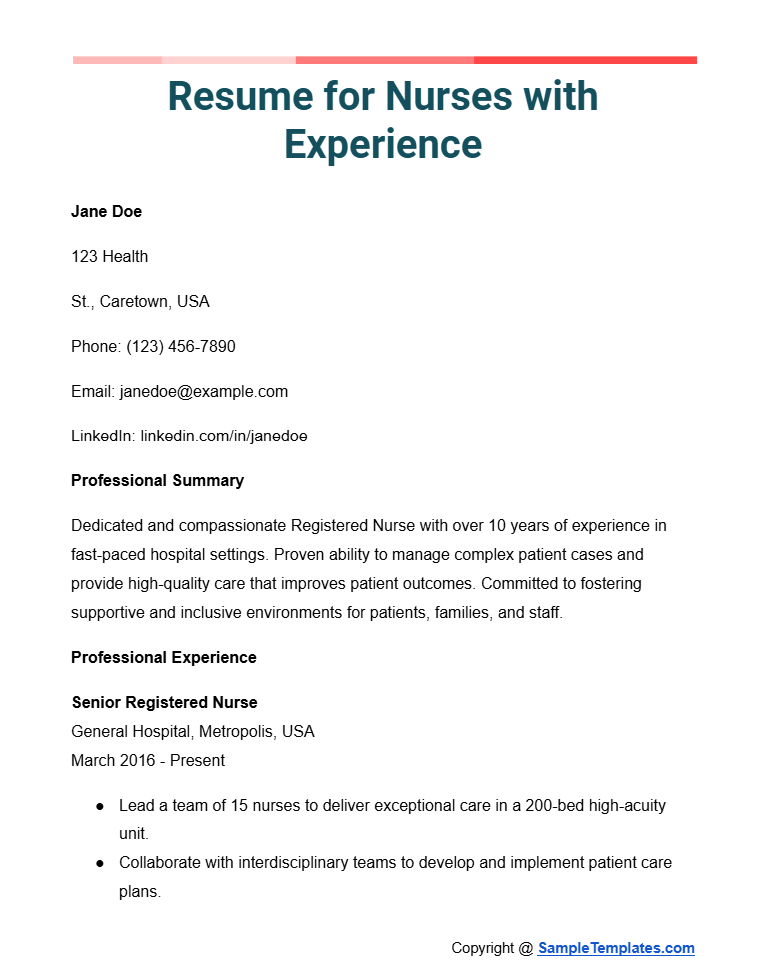
Nursing Resume with Clinical Experience
Jane Doe, RN
123 Care Blvd., Nursington, USA
Phone: (123) 456-7890
Email: [email protected]
LinkedIn: linkedin.com/in/janedoe
Professional Summary
Registered Nurse with over 8 years of clinical experience in acute care and medical-surgical settings. Skilled in providing high-quality clinical care with a focus on surgical preparation and recovery. Adept at managing critical care situations and ensuring patient safety and comfort.
Clinical Experience
Registered Nurse, Medical-Surgical Unit
St. Mary’s Health Center, Big City, USA
August 2015 – Present
- Provide comprehensive nursing care to patients in a 150-bed unit handling postoperative recovery and acute medical conditions.
- Perform assessments, administer medications, and monitor post-surgical recovery, managing an average of 10-12 patients per shift.
- Collaborate with surgeons, anesthesiologists, and other healthcare professionals to optimize patient outcomes.
- Educate patients and families on post-surgical care and health maintenance, achieving high levels of patient satisfaction.
Registered Nurse, Acute Care Department
Healthcare Hospital, Smalltown, USA
May 2012 – July 2015
- Assessed patient health problems and needs, developed and implemented nursing care plans, and maintained medical records.
- Administered nursing care to ill, injured, convalescent, or disabled patients.
- Advised patients on health maintenance and disease prevention or provide case management.
Education
Bachelor of Science in Nursing
University of Care, Caretown, USA
September 2008 – May 2012
Licenses and Certifications
- Registered Nurse (RN) – Licensed in USA
- Certified Medical-Surgical Registered Nurse (CMSRN)
- Advanced Cardiovascular Life Support (ACLS)
- Basic Life Support (BLS)
Clinical Skills
- Surgical Assistance
- Wound Care and Management
- Patient and Family Education
- Acute and Chronic Care Competence
- Medication Administration
- Multidisciplinary Team Collaboration
Professional Memberships
- Academy of Medical-Surgical Nurses (AMSN)
- American Nurses Association (ANA)
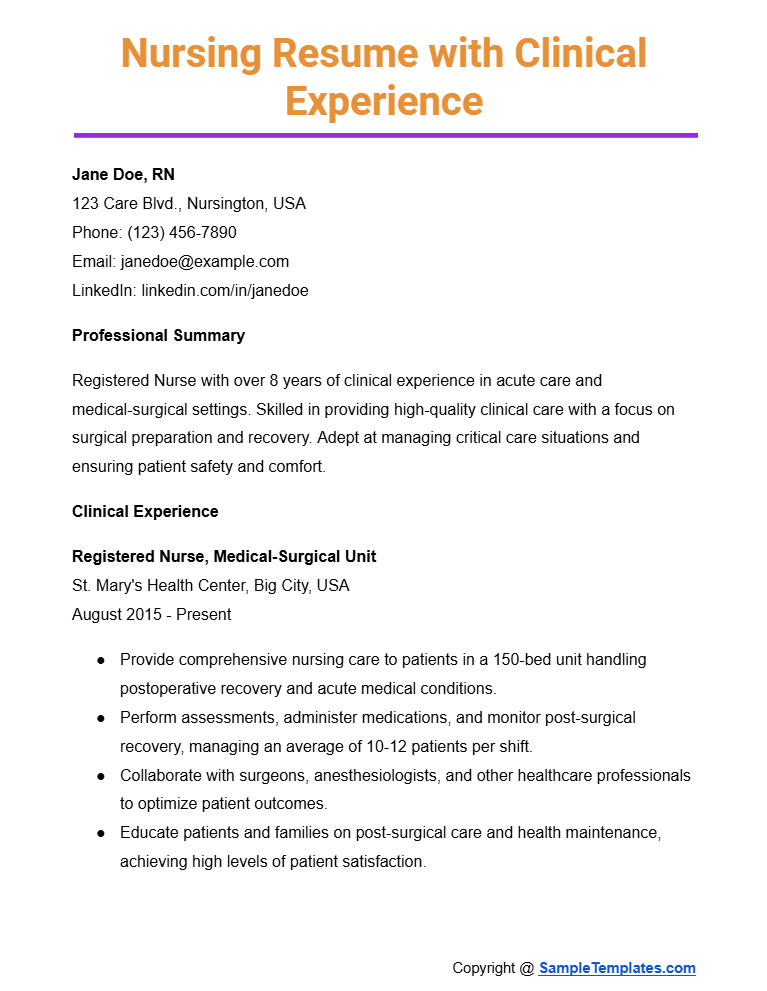
Nursing Resume with No Experience
John Doe, RN
456 Healing Way, Medville, USA
Phone: (456) 789-0123
Email: [email protected]
LinkedIn: linkedin.com/in/johndoe
Professional Summary
Newly licensed Registered Nurse with a strong academic background and hands-on training gained through extensive clinical practicums. Eager to leverage skills in patient care and clinical operations to contribute to the healthcare team. Highly motivated, enthusiastic, and committed to providing high-quality care.
Education
Bachelor of Science in Nursing
City University of Health Sciences, Cityville, USA
Graduated: May 2023
GPA: 3.8/4.0
- Completed courses in pharmacology, health assessment, patient care, and medical ethics.
- Received the Dean’s List award for all semesters.
Clinical Rotations
General Medical/Surgical Unit
City Hospital, Cityville, USA
January 2023 – April 2023
- Participated in direct patient care under supervision, including assessment, planning, implementation, and evaluation of nursing care.
- Assisted with the administration of medications and treatments as prescribed by physicians.
- Monitored vital signs and documented patient progress.
Pediatric Nursing Unit
City Hospital, Cityville, USA
September 2022 – December 2022
- Provided age-appropriate nursing care to pediatric patients.
- Assisted with routine patient care activities, including feeding, bathing, and changing.
- Supported family members with educational resources on child care and disease management.
Obstetrics and Gynecology Unit
City Hospital, Cityville, USA
May 2022 – August 2022
- Observed and assisted in the care of postpartum mothers and newborns.
- Helped prepare patients for delivery and assisted in neonatal care post-delivery.
- Educated patients on postnatal exercises and baby care.
Certifications
- Registered Nurse (RN) License, State of USA
- Basic Life Support (BLS) Certified by the American Heart Association
- Advanced Cardiovascular Life Support (ACLS)
Skills
- Strong clinical judgment
- Patient and family education
- Time management and prioritization
- Team collaboration and communication
- Proficient in electronic health record (EHR) systems
Professional Affiliations
- National Student Nurses’ Association (NSNA)
- American Nurses Association (ANA), Member
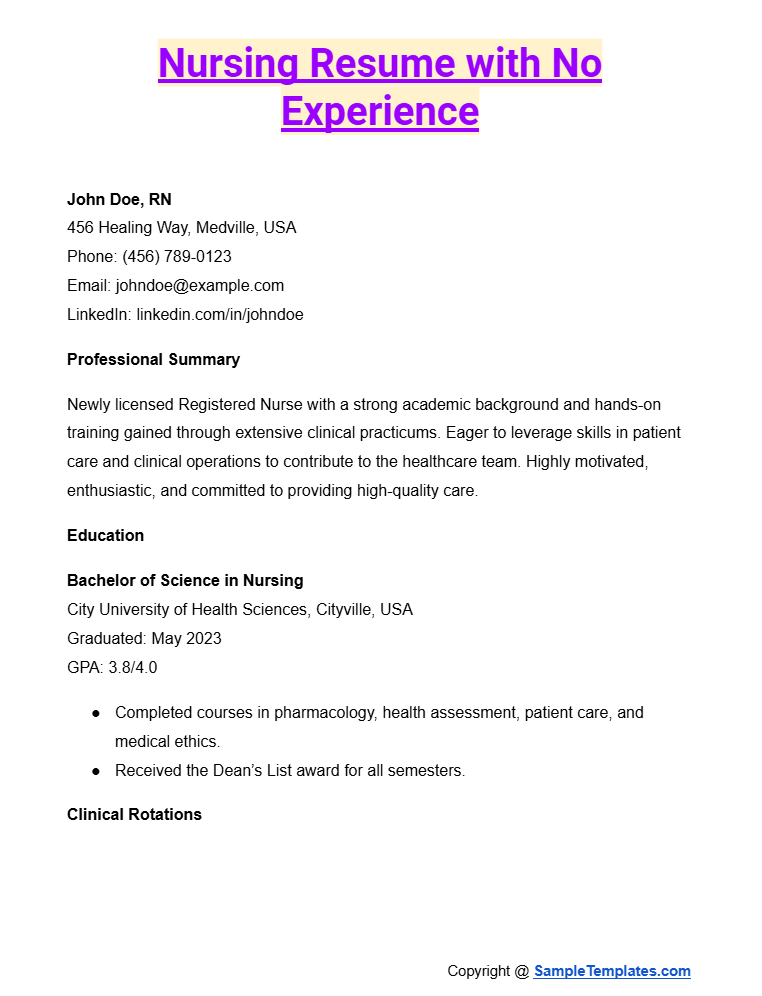
Nursing Resume for Job
Jane Smith, RN
789 Caremore Lane, Healville, USA
Phone: (789) 456-1230
Email: [email protected]
LinkedIn: linkedin.com/in/janesmith
Professional Summary
Experienced Registered Nurse with over 5 years of expertise in critical care and cardiology. Skilled in providing compassionate, patient-centric care and implementing evidence-based nursing practices to improve patient outcomes. Committed to enhancing team efficiency and patient education in fast-paced settings.
Professional Experience
Registered Nurse – ICU
Heartland Health System, Metro City, USA
March 2018 – Present
- Deliver high-quality care to patients in a 30-bed intensive care unit, managing complex medication schedules, and monitoring life-support equipment.
- Work collaboratively with interdisciplinary teams, including doctors, therapists, and support staff, to formulate and execute comprehensive care plans.
- Educate patients and their families on disease processes, medical-surgical procedures, and proper care techniques, ensuring effective discharge planning.
Registered Nurse – Cardiology Department
Regional Hospital, Smallville, USA
June 2015 – February 2018
- Specialized in the care for heart disease patients, including post-operative recovery and chronic condition management.
- Performed routine patient evaluations and contributed to the development of treatment plans based on observed symptoms.
- Led a department initiative to improve patient education regarding lifestyle adjustments for heart health, reducing readmission rates by 15%.
Education
Bachelor of Science in Nursing
University of Healthcare Excellence, Caretown, USA
September 2011 – May 2015
- Graduated Magna Cum Laude
- President, Student Nurses Association (2014-2015)
Certifications
- Registered Nurse (RN), State of USA
- Certified Critical Care Nurse (CCRN)
- Advanced Cardiovascular Life Support (ACLS)
- Pediatric Advanced Life Support (PALS)
Skills
- Acute and Critical Care Nursing
- Patient and Family Advocacy
- Clinical and Administrative Healthcare
- Medical Recordkeeping
- Strong Communication and Interpersonal Skills
Professional Affiliations
- American Association of Critical-Care Nurses (AACN)
- American Nurses Association (ANA)
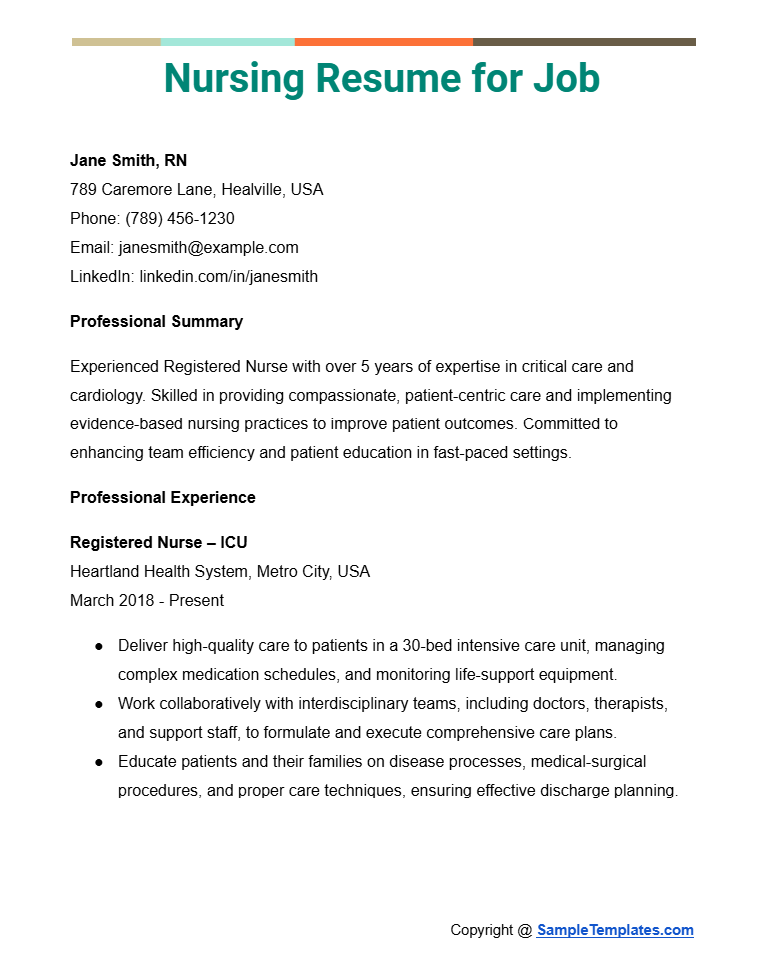
Browse More Templates On Nursing Resume
1. Nursing Resume Template
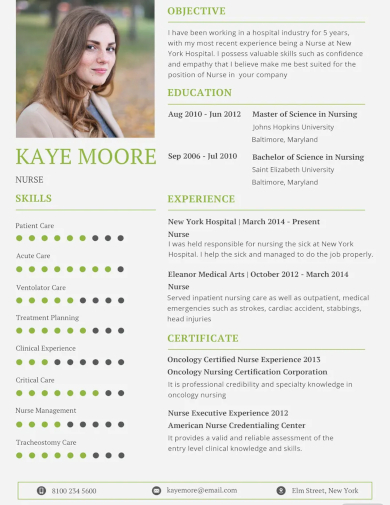
2. Nursing Unit Manager Resume Format
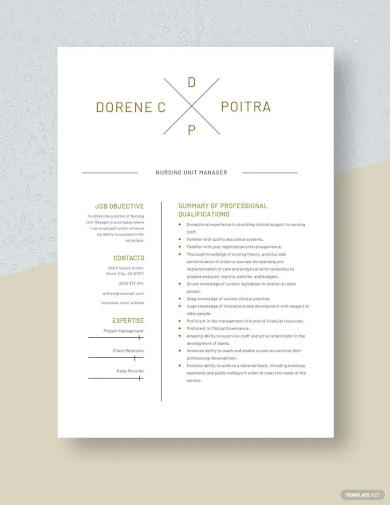
3. Nursing Instructor Resume Template
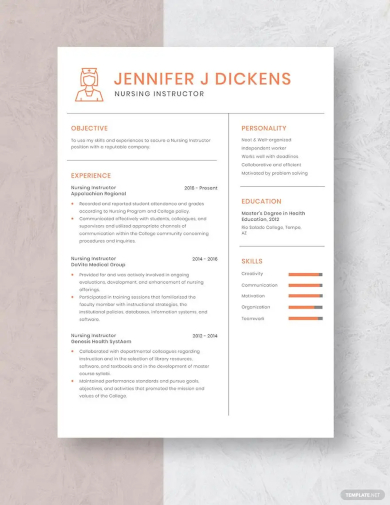
4. Nursing Director Resume Template
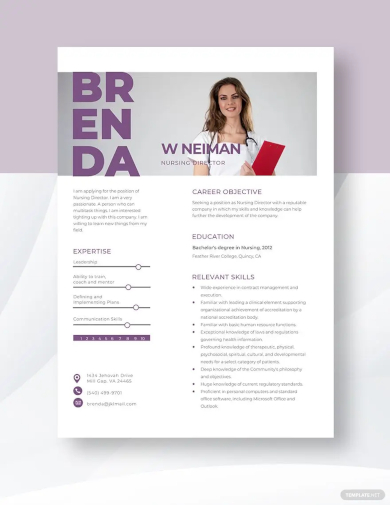
5. Certified Nursing Assistant Resume Template
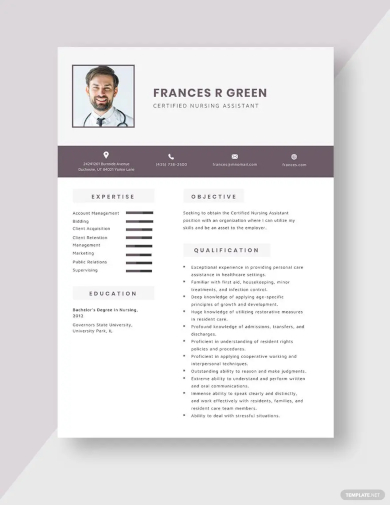
How to Prepare a Nursing Resume?
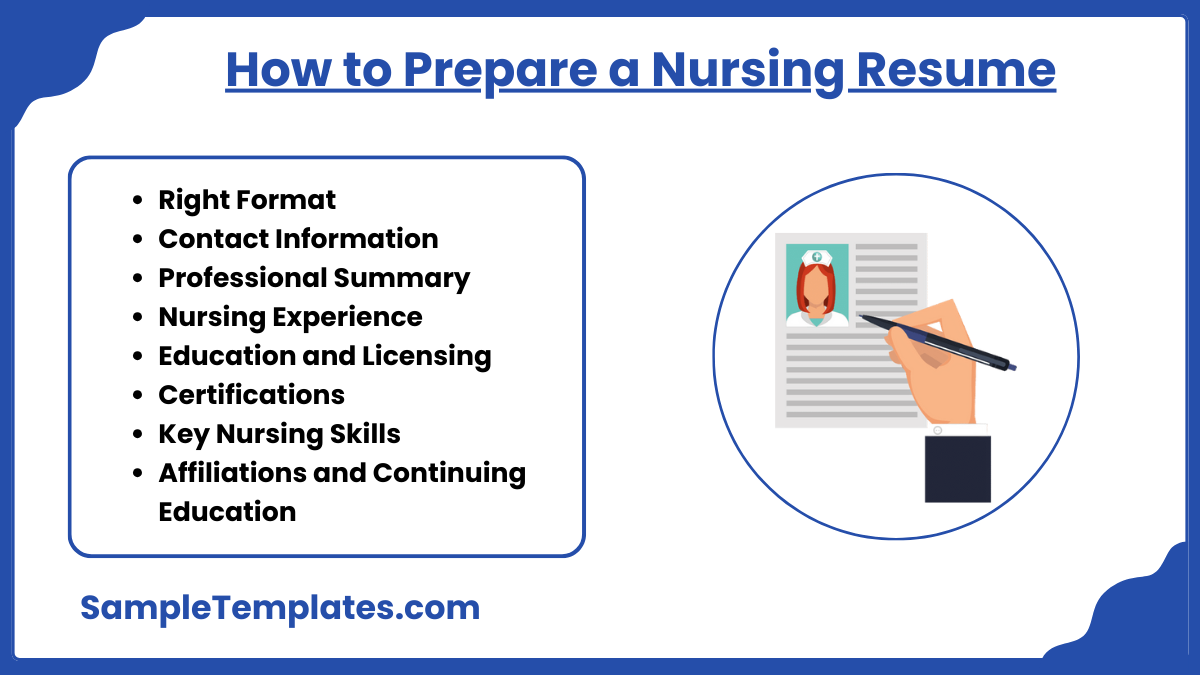
- Choose the Right Format: Opt for a clean, professional layout that highlights your most relevant experience first. Common formats include chronological, functional, or a combination.
- Start with Contact Information: Include your full name, phone number, email address, and LinkedIn profile (if applicable) at the top of your resume.
- Include a Professional Summary: Write a brief 2-3 sentence summary that highlights your nursing credentials, years of experience, and any specialties. Tailor it to reflect the requirements of the job you’re applying for. You can also see more on Nurse CV.
- Detail Your Nursing Experience: List your work history in reverse chronological order. For each position, include your job title, dates of employment, the facility’s name, and location. Describe your duties with emphasis on specific achievements and skills.
- Highlight Education and Licensing: Clearly list your nursing degree(s), the granting institution, and graduation dates. Include details of your nursing license—type, issuing body, and expiration date.
- Showcase Your Certifications: Feature any relevant certifications such as BLS, ACLS, or specialty certifications like CCRN, that enhance your qualifications. You can also see more on New Nurse Resume.
- Include Key Nursing Skills: Add a section that outlines your nursing skills, such as patient care, medication administration, compliance with HIPAA, and proficiency in electronic health record systems.
- Professional Affiliations and Continuing Education: Mention any nursing associations you’re a member of and any recent continuing education courses you’ve taken to keep your skills up-to-date.
6. Nursing Clinical Coordinator Resume Template
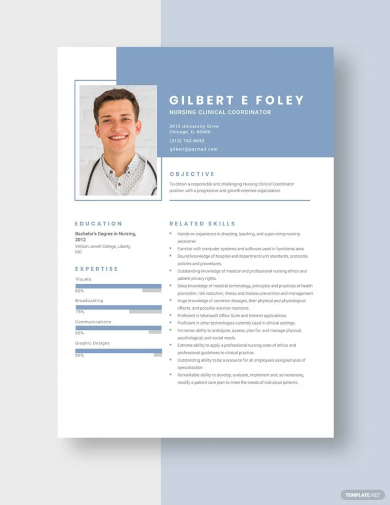
7. Occupational Health Nursing Director Resume Template
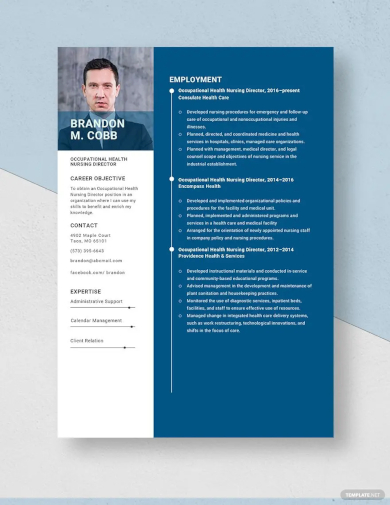
8. Nursing Case Manager Resume Template
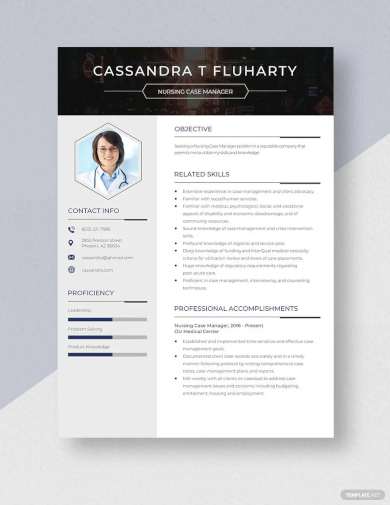
9. Nursing Home Admissions Director Resume Template
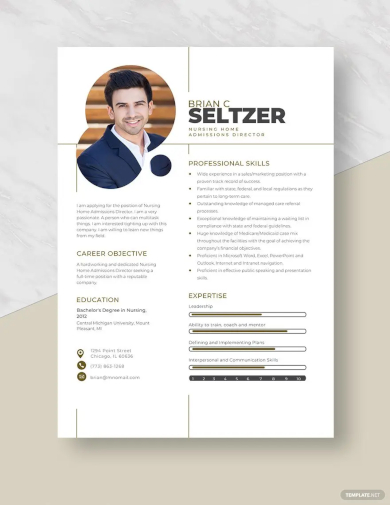
10. Online Nursing Instructor Resume Template
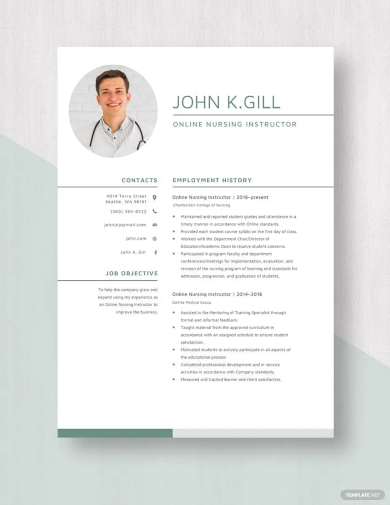
11. Nursing Unit Secretary Resume Template
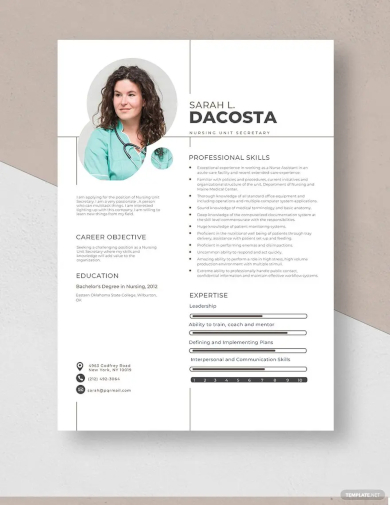
12. Nursing Aide Resume Template
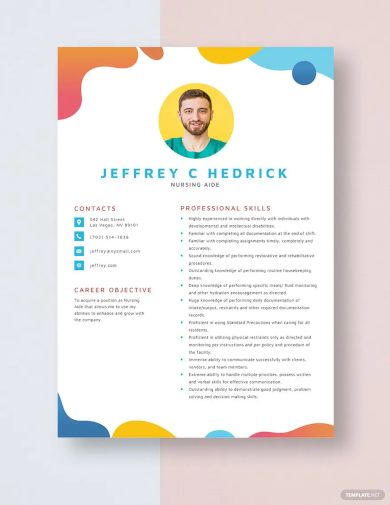
13. Geriatric Nursing Assistant Resume Template
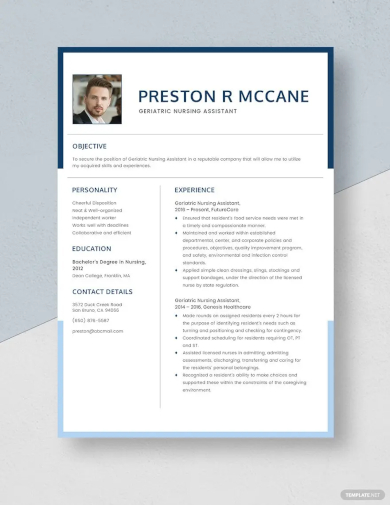
14. Clinical Nurse Resume Template
This is a perfect resume format for a clinical nurse. It is well-formatted, and it is very easy to find the required details at once. It has provisions for education, languages, work experience, training, certifications, activities, and references.
15. Sample Nurse Resume in Word
This is a perfect hospice nurse resume, and it is in Word file and hence, anyone can edit it according to their requirements. It has a sample professional summary filled with action words followed by core qualifications, skills, and experience.
What is a Nursing Summary for a CV?
A nursing summary, often included in a CV or resume, is a concise yet comprehensive section that provides an overview of your nursing career. It serves as a snapshot of your qualifications, skills, and professional achievements. Here’s a guide to creating an effective nursing summary for your CV:
Introduction:
Begin your nursing summary with a sample brief introduction that includes your name, current job title, and a quick statement about your commitment to patient care and healthcare excellence.
Professional Experience:
Detail your nursing career in a reverse chronological order, starting with your most recent position. Include the following elements:
- Job Titles and Facilities: Mention the titles of the positions you’ve held and the names of the healthcare facilities where you’ve worked.
- Dates of Employment: Provide the dates (month and year) of your employment for each position.
- Key Responsibilities: Summarize your primary responsibilities and duties in each role. Focus on specific achievements and notable contributions.
- Patient Population: Highlight any specialization or focus on specific patient populations (e.g., pediatrics, geriatrics) if applicable.
- Technological Proficiency: Mention any technologies or systems you are proficient in, such as Electronic Health Records (EHR) or specialized medical software.
Clinical Skills:
Create a section that sample outlines your clinical skills, emphasizing both technical and soft skills. Include aspects like:
- Patient Assessment: Detail your expertise in conducting thorough patient assessments, including physical examinations and health histories.
- Medication Administration: Highlight your proficiency in administering medications, dosage calculations, and ensuring patient safety.
- Clinical Procedures: List specific clinical procedures you are skilled in, such as wound care, IV insertion, and catheterization.
- Team Collaboration: Showcase your ability to work collaboratively with interdisciplinary teams, fostering effective communication and patient-centered care.
Certifications and Licenses:
Clearly present your nursing licenses and any additional certifications you hold, including the expiration dates if relevant.
Education:
Provide details about your educational background, including the nursing school attended, degree earned, graduation date, and any academic honors.
Professional Memberships:
Mention any memberships in professional nursing organizations, demonstrating your commitment to ongoing professional development.
Accomplishments and Awards:
Highlight any awards, recognitions, or special achievements throughout your nursing career that set you apart.
Career Goals:
Conclude your nursing summary with a sentence or two about your career goals list and aspirations, emphasizing your commitment to continuous learning and improvement.
16. Volunteer Nurse Resume Format
This is a complete set of Sample Nurse Resumes with cover letters and other necessary instructions for an aspiring volunteer nurse. It contains multiple formats and samples for writing creative and stunning resumes of different kinds. The sample cover letters are equally important and well-designed.
Usage of Nursing Resumes
The sample resumes are for students, graduates, and professionals to use them as a reference to prepare their stunning resumes so that they can create an impressive image of themselves in the mind of the interviewers when they go through the resumes. One can also edit them to put minimum effort to prepare their resumes as per need. There are several types of resumes catering to different types of nursing jobs. There are Sample Statements that contain action words and phrases that will create the necessary impact.
17. Registered Nurse Resume Template
This is a Sample Resume for a Registered Nurse job. The design is captivating, and it begins with a personal statement followed by employment history and duties performed. Then it lists areas of expertise, academic qualifications, and references.
18. Staff Nurse Resume Template
This is a clean format for writing a superb resume for staff nurse job description. It is in tabular form and has provisions to write career objective, certifications, education, professional experience, clinic experience, awards and honors, professional activities and references.
19. Graduate Nurse Resume Template
Targeted audience for the Sample Nursing Resumes
The targeted audiences for the Nursing Resume Samples are the nursing students who want to apply for a nursing internship sample program to get a firsthand experience. They are useful for nursing graduates who want to apply for relevant jobs to get their first job in life. They are also helpful for the experienced professional nurses who are willing to change their hospital or nursing homes to get better opportunities and salary.
20. Nursing Student Resume in PDF
21. Experienced Nurse Resume Template
What Should not be Included in a Nursing Resume?
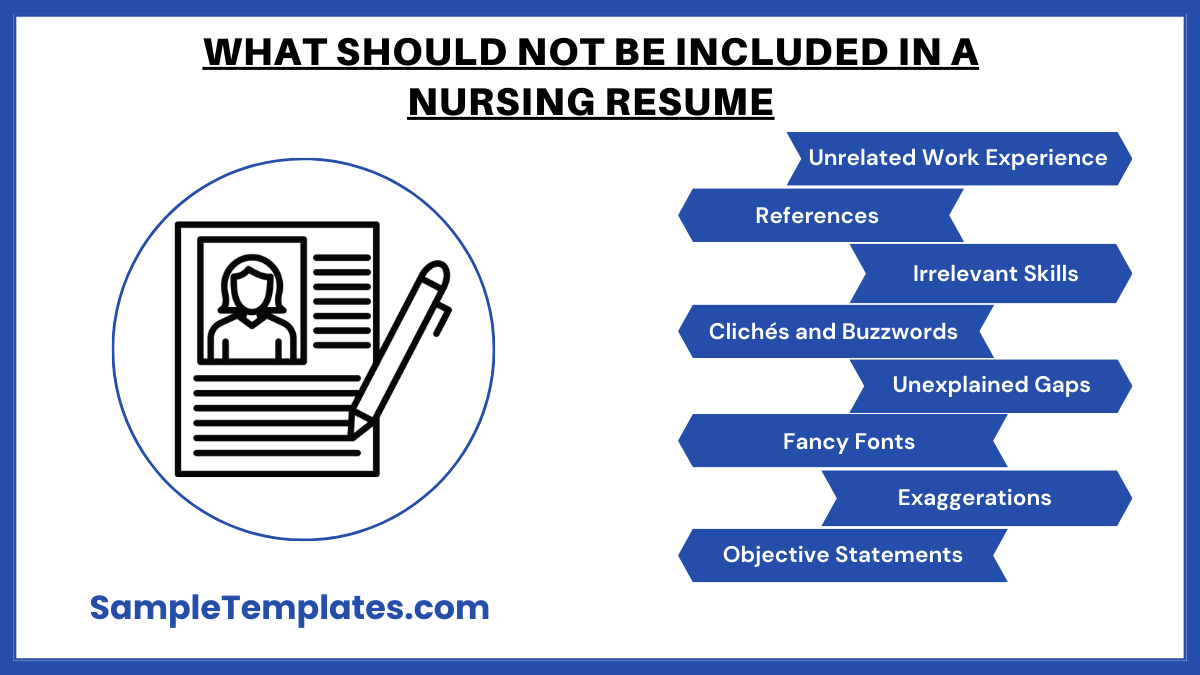
Creating an effective nursing resume is crucial for showcasing your skills and experience to potential employers. To ensure your resume stands out, it’s important to know what not to include. Here are guidelines on what to avoid in your nursing resume:
- Personal Information Overload:
- Avoid: Including excessive personal details like age, marital status, or social security number.
- Include: Only relevant and necessary information such as your full name, contact information, and nursing credentials.
- Unrelated Work Experience:
- Avoid: Including unrelated jobs that don’t contribute to your nursing qualifications.
- Include: Prioritize relevant clinical and healthcare experiences, focusing on patient care and medical skills.
- Generic Career Objectives:
- Avoid: Using generic or vague career objectives.
- Include: A professional summary that succinctly communicates your qualifications, achievements, and career goals.
- Long Paragraphs:
- Avoid: Dense paragraphs that are challenging to read.
- Include: Use concise bullet points to highlight your achievements, skills, and responsibilities for easy readability. You can also see more on Nursing Resume Objective.
- Clichés and Buzzwords:
- Avoid: Overused terms like “hardworking” or “team player.”
- Include: Specific, action-oriented language that demonstrates your unique contributions and achievements.
- Irrelevant Skills:
- Avoid: Including skills that are outdated or not relevant to the nursing profession.
- Include: Showcase skills directly related to patient care, clinical procedures, and healthcare technologies.
- High School Information:
- Avoid: Including details about high school education unless you’re a recent graduate.
- Include: Prioritize showcasing your nursing degree, certifications, and relevant continuing education.
- Unprofessional Email Addresses:
- Avoid: Using unprofessional or informal email addresses.
- Include: Use a professional email address for job applications.
- References:
- Avoid: Including references on your resume.
- Include: Indicate that references are available upon request.
- Jargon and Abbreviations:
- Avoid: Excessive use of healthcare jargon that may be unfamiliar to non-medical professionals.
- Include: Ensure your resume is accessible to a diverse audience by limiting the use of abbreviations and explaining terms when necessary.
- Generic Job Descriptions:
- Avoid: Using generic job descriptions.
- Include: Tailor your resume to each specific role, highlighting unique achievements, responsibilities, and outcomes.
- Hobbies and Interests:
- Avoid: Including unrelated hobbies or personal interests.
- Include: Focus on showcasing your professional qualifications and achievements.
- Unexplained Gaps:
- Avoid: Leaving unexplained periods of unemployment.
- Include: Address any employment gaps transparently, providing context if necessary.
- Fancy Fonts and Formatting:
- Avoid: Elaborate fonts or excessive formatting.
- Include: Maintain a clean and professional appearance with a simple and readable layout.
- Lies or Exaggerations:
- Avoid: Providing inaccurate information or exaggerating achievements.
- Include: Be truthful about your qualifications and experiences.
- Objective Statements:
- Avoid: Traditional objective statements.
- Include: Replace with a professional summary providing a snapshot of your nursing qualifications and career goals. You can also see more on Medical Resume.
- Long Paragraphs:
- Avoid: Dense paragraphs.
- Include: Opt for concise bullet points to highlight your achievements, skills, and responsibilities for easy readability.
By avoiding these common pitfalls, you can craft a nursing resume that effectively communicates your skills, qualifications, and experiences to potential employers, increasing your chances of securing a nursing position.
22. Professional Nurse Resume Template
23. Entry Level Nurse Resume Template
The above-listed Resume Samples cater to all sorts of nursing jobs such as registered nurse resume, a volunteer nurse, staff nurse, clinical nurse as well as hospice nurse job. Nursing students who want to get their first job and even the professional nurses who want to switch hospitals can use them to form stunning resumes and list their qualities and skills effectively to impress the interviewer.
Why is a Nursing Resume Important?
A nursing resume is a crucial tool for healthcare professionals seeking employment in the dynamic and competitive field of nursing. It serves as a comprehensive document that highlights a candidate’s qualifications, skills, and experiences in the healthcare industry. Here are several reasons why a nursing resume is of utmost importance:
- First Impressions Matter:
- Importance: A resume is often the first interaction a potential employer has with a candidate. It provides an opportunity to make a positive and lasting first impression.
- Showcases Qualifications and Education:
- Importance: Clearly outlines the candidate’s educational background, degrees, sample certifications, and licensure, essential elements for evaluating eligibility for nursing positions.
- Highlights Clinical and Professional Experience:
- Importance: Details relevant clinical experiences, showcasing the breadth and depth of a nurse’s professional background. This section helps employers understand the candidate’s practical skills and competencies.
- Demonstrates Specialized Skills:
- Importance: Enables the candidate to showcase specialized skills such as patient care, medication administration, critical thinking, and proficiency in healthcare technologies—all vital for success in the nursing profession.
- Quantifies Achievements:
- Importance: Allows nurses to quantify their achievements, including patient outcomes, quality improvement initiatives, and successful collaborations. This information provides concrete evidence of the nurse’s impact in previous roles.
- Tailored for Specific Positions:
- Importance: Can be customized for each job application, emphasizing the most relevant experiences and skills for a particular nursing role. This tailoring increases the likelihood of catching the attention of hiring managers.
- Facilitates Applicant Tracking System (ATS) Compatibility:
- Importance: Many employers use ATS to streamline the hiring process. A well-optimized resume ensures compatibility with these systems, increasing the chances of passing the initial screening.
- Provides Contact Information:
- Importance: Includes accurate and up-to-date contact information, facilitating easy communication between the employer and the candidate.
- Professional Summary Showcasing Career Objectives:
- Importance: The professional summary or sample objective statement provides a snapshot of the nurse’s career goals and how their qualifications align with the specific job they are applying for.
- Demonstrates Commitment to Continuing Education:
- Importance: Highlights any additional certifications, workshops, or continuing education, showcasing the nurse’s commitment to staying current with industry trends and best practices.
- Easy Reference for Interviews:
- Importance: Serves as a reference point during interviews, allowing nurses to speak confidently about their experiences, skills, and achievements. It helps in providing detailed and accurate responses to interview questions.
- Proof of Compliance with Regulatory Requirements:
- Importance: Provides evidence of compliance with licensing and regulatory requirements, including any ongoing professional development, required for nursing practice.
- Differentiates the Candidate:
- Importance: Helps candidates stand out from the competition by presenting a well-organized and clearly articulated document that effectively communicates their unique qualifications and contributions.
- Promotes Self-Reflection:
- Importance: The process of creating a resume encourages nurses to reflect on their career path, achievements, and goals. This self-reflection aids in identifying areas for professional growth and development. You can also see more on Graduate Nurse Resume.
- Supports Career Advancement:
- Importance: A strong resume is an essential tool for nurses looking to advance their careers. It positions them as qualified and capable professionals, opening doors to opportunities for career progression.
FAQS
What should a nursing job include on a resume?
A nursing resume should include essential elements such as qualifications, education, clinical experiences, specialized skills, achievements, and contact information for effective job applications.
How long should nursing resume be?
A nursing resume should typically be one to two pages long, focusing on key qualifications, experiences, and skills relevant to the nursing profession. You can also see more on Student Nurse Resume.
What type of resume should a nurse use?
A nurse should use a chronological resume format, highlighting work experience and achievements in reverse chronological order to showcase their career progression and relevant skills.
Do nurses need CV or resume?
In the United States, nurses typically use a resume rather than a CV when applying for jobs. Resumes are concise and focus on relevant experience, skills, and achievements. You can also see more on Healthcare Resume.
How can I improve my nursing resume?
Enhance your nursing resume by emphasizing relevant skills, certifications, and achievements. Tailor it to the specific job, highlight patient outcomes, and showcase your commitment to continuous learning and improvement.
In conclusion, crafting an effective nursing resume involves showcasing key skills, certifications, and achievements tailored to the job. Emphasize patient outcomes and commitment to ongoing professional development for a compelling sample application. You can also see more on Nursing Assistant Resume.
If you have any DMCA issues on this post, please contact us.
Related Posts
Sample Nurse CV Templates
Sample Resume For College Student
Resume Summary Templates
Medical Student CV Samples & Templates
Fresher Resume Examples
Resume Profile Samples & Templates
Sample High School CV Templates
Sample Resume Templates
Sample Teaching CV Templates
Teacher Resume Templates
FREE 15+ Director CV Samples in MS Word | Pages | PSD | Publisher | PDF
FREE 10+ Sample MBA Resume Templates in MS Word | PDF
FREE 9+ Sample Pharmacist Resume Templates in PDF
FREE 8+ Receptionist Resume Samples in MS Word | PDF
FREE 8+ Sample Hospitality Resume Templates in MS Word | PDF
